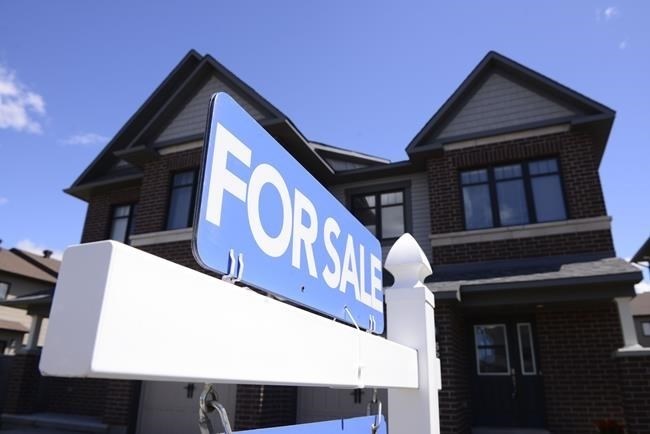
Experts suggest homeowners explore their options before deciding to sell their property as high mortgage renewals disrupt household budgets. A new home is shown for sale in a housing development in Ottawa on Tuesday, July 14, 2020.
Image Credit: THE CANADIAN PRESS/Sean Kilpatrick
October 22, 2023 - 11:30 AM
TORONTO - As more and more homeowners face mortgage renewals at surprisingly higher interest rates, some are facing the dreaded prospect of having to sell a home they can no longer afford.
But experts say while that option may be on the table, there are steps financially stretched homeowners can take before putting a "For Sale" sign on their front lawn.
"We need to acknowledge at the start that selling the house might end up being the only option for some homeowners," said Becky Western-Macfadyen,a financial coaching manager with Credit Canada.
However, homeowners should begin with reworking their family spending, she said, by looking at the money coming in and going out, including frequent expenses on household maintenance, car repairs and medical bills.
The next step would be to gather all potential ideas on paper to find ways of diversifying their income sources. That might mean a second job, asking for a raise at work or renting a room in the house, Western-Macfadyen suggested.
"Be realistic," she cautioned.
She also warned that in dire cases, drastic measures might be needed to lower spending.
"It's not the time to focus on cutting out lattes," she said. "You want to make sure you're making some big changes and it needs to be sustainable."
She suggested homeowners put any spare cash toward their current mortgage with a lump-sum payment before it gets renewed at a higher rate to help manage the expected increased monthly payment.
Homeowners can also seek help from a financial adviser or a certified financial planner to gauge what an affordable, yet sustainable, lifestyle could look like, according to Tony Salgado, founder of AMS Wealth.
As the mortgage renewal approaches, don't assume the first offer presented by a lender is the best rate, he said.
"If you have the opportunity to work with a mortgage broker, make sure you shop around," he said. "Because one per cent or a half per cent savings could be very valuable in today's environment."
The mortgage amortization, picking the most suitable option between fixed and variable rates and finding the best rate offer could also help soften the burden of higher rates upon renewal.
Current mortgage rates with traditional banks are north of five per cent, and rates with alternative lenders can be even higher. That compares with mortgage rates below three per cent during the pandemic when the Bank of Canada's benchmark rate was ultralow.
Salgado pointed out there's a popular belief that the rapid surge in mortgage rates is only affecting low- or middle-income households.
"It is a bit misleading," he said. "Whether you are low-income or a high-income person, provided you have a mortgage, these rates are affecting you."
However, someone with a higher income may be able to adjust better to higher borrowing costs by moving around assets, capital or retirement savings, Salgado said.
"When we work with lower-income people with a higher mortgage, they may not come with so many other investment accounts that you could tweak or move around to help offset those costs."
Salgado said some younger homeowners are turning to their parents for help in keeping up with rising mortgage payments, as a sort-of advance on their expected inheritance.
"We see that happening in our community," he said. "A lot of older generations would like to see the fruits of their hard work benefit the family while they're still alive."
However, if all of these options have been exhausted, it might mean it's time to move on.
"Mortgage is typically the very last thing that someone would let go," said Western-Macfadyen. "They probably maxed out their credit cards and lines of credit and at that point, they just don't see any other alternatives.
"You want to then take action," she said, which may include selling, foreclosure or surrender of the home.
Western-Macfadyen suggested homeowners should consider opting for a sale rather than getting foreclosed to avoid having the property sell for below market value and incurring the costs that might arise in a situation of surrender.
As higher interest rates take a toll on housing market activity, it could make it harder for homeowners to get the price they expected from the sale.
Talking to a licensed insolvency trustee could also be an option to help alleviate the stress of selling the house and managing debts.
But selling the property doesn't necessarily spell the end of the homeowner's responsibilities, she warned. Homeowners would still have to pay leftover utility expenses and house insurance until the ownership is transferred.
"It's not a pure walk away."
If the house sells at a loss, Western-Macfadyen said the homeowner is responsible for covering the difference — likely coming from other investments or reviewing other options such as consumer proposal or bankruptcy.
After the house is sold, the most obvious question follows: "Then what?"
Western-Macfadyen said people who sold their home have to face the housing market again — with higher interest rates, skyrocketing rental prices and the overall affordability crisis.
"There's a belief that rates are going to fall again," she said. "But that might not happen for years."
"Anyone who is going to be renewing in the next year or two is definitely going to feel this pinch."
This report by The Canadian Press was first published Oct. 16, 2023.
News from © The Canadian Press, 2023